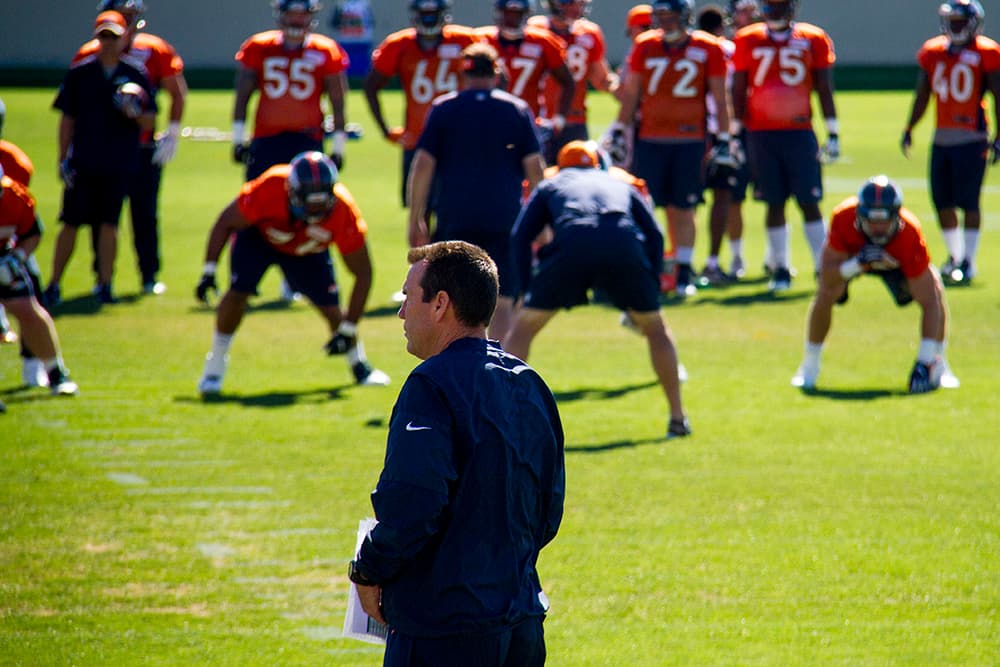
The Denver Broncos’ 1999 season was a disaster.
Denver, fresh off winning Super Bowls in 1997 and '98, was without quarterback John Elway for the first time since the early ‘80s. Elway retired shortly after guiding Denver to back-to-back titles.
The Broncos started the year with four straight losses. They got hammered by Miami on Monday Night Football in Week 1, and lost a close one to the Jets in Week 4 in a game where star running back Terrell Davis shredded his knee. They finished the season 6-10 — last place in the AFC West and out of the playoffs.
Seventeen years later, the Broncos find themselves in a similar position. They will try a Super Bowl repeat without another Hall of Fame QB: Peyton Manning. Many people out there on the Interwebs — including betting professionals — believe Denver will get back to the playoffs. As of Aug. 11, Bovada had Denver as narrow favorites to win the AFC West for the sixth-straight year.
But I believe the evidence suggests the Broncos won't make it.
The Broncos' slap-fight of a quarterback battle still hasn't been decided. No matter what option head coach Gary Kubiak goes with, it doesn't look good. There’s another less sexy reason, too: good old-fashioned regression to the mean. Denver made the playoffs last year by relying on its historically great defense and success in close games. The numbers show that it's unlikely either of those things continue this year.
Settle in, queue up some old Manning highlights for comfort and let me make a case for my lukewarm take: The 2016 Denver Broncos probably aren’t going to make the playoffs.
Obviously, this argument starts with the guys under center.
Mark Sanchez and Trevor Siemian were the frontrunners for the starting quarterback job going into Saturday’s preseason game against the San Francisco 49ers. In a little more than two quarters, they managed to combine for three turnovers.
Siemian committed the first by staring down his receiver for what felt like an eternity; the pass was picked off and returned for a touchdown. Sanchez was responsible for the other two. He fumbled twice while Denver was in field-goal range. San Francisco recovered both.
A look back at Siemian’s and Sanchez’s history isn’t encouraging, either.
Siemian was a mediocre-at-best college player at Northwestern. He split time for most of his career there. As a senior, he threw seven touchdowns, 11 interceptions and averaged 5.6 yards per attempt. In his rookie season last year, he played one snap: a kneel-down.
Sanchez, on the other hand, has plenty of NFL experience under his belt. He’s played 75 regular-season games over six NFL seasons. In those games, he’s turned the ball over 105 times (84 picks, 21 fumbles lost). That comes out to an average of 1.4 per contest.
Rookie Paxton Lynch looked the best of all three QBs Saturday, and I suppose he could still win the job. But throwing him into the fire right away doesn’t seem smart.
Maybe you're thinking, So what? The Broncos got pitiful quarterback play last year — Manning and Osweiler combined to throw 19 TDs versus 23 picks — and they still went 12-4.
Well, this is the regression part.
The biggest reason the 2015 Broncos won the Super Bowl was their defense. In the regular season, that unit finished first in yards allowed and fourth in points allowed. In the playoffs, they limited the Steelers, Patriots and Panthers to 16, 18 and 10 points, respectively.
The Broncos defense should still be very good this year. They return everybody except linebacker Danny Trevathan and defensive end Malik Jackson. They’re deep. They’re still young (only DeMarcus Ware and Aqib Talib are 30 or older). The problem is, history tells us the defense will decline.
The folks at Football Outsiders have a stat called Defensive DVOA, which stands for Defense Adjusted Value over Average. Defensive DVOA helps contextualize the plays a defense allows. For example: A three-yard run surrendered on second-and-16 during garbage time is not the same as a three-yard run given up on fourth-and-4 in a close game. Clearly, the latter is more valuable in terms of wins and losses.
In 2015, Broncos defense had the eighth-best DVOA since Football Outsiders started tracking it in 1989. That Broncos D is right up there with defenses such as the '02 Buccaneers, '09 Jets and '13 Seahawks. Here’s the entire top-10 list. The larger the negative number, the more dominant the defense.
- 1991 Philadelphia Eagles (-42.4%)
- 2002 Tampa Bay Bucaneers (-31.8%)
- 2008 Pittsburgh Steelers (-29.0%)
- 2004 Buffalo Bills (-28.5%)
- 2008 Baltimore Ravens (-27.8%)
- 2012 Chicago Bears (-26.7%)
- 2013 Seattle Seahawks (-25.9%)
- 2015 Denver Broncos (-25.8%)
- 2009 New York Jets (-25.5%)
- 2000 Tennessee Titans (-25.0%)
Every single one of these defenses had a worse DVOA the following season. Every single one. Three of them — the ’00 Titans, ’04 Bills and ’12 Bears — even posted the 25th-worst DVOA in the NFL the year after.
The Broncos almost assuredly won’t experience that level of drop-off; there’s too much talent for that. But there will be some decline. And in a league where there are only 16 regular-season games, where the margin of error is so small, that matters.
Other metrics point toward it as well.
As ESPN's Bill Barnwell wrote, Denver went 9-3 in one-score games in 2015 — a .750 winning percentage that was the third-best in football in those circumstances. Good, right?
The problem is, teams that win such a high percentage of close games one year tend not to the next. In 2014, eight teams had a .750 winning percentage in one-score games. They combined for a 35-7-1 record. A year later, those same teams went 34-25.
That regression, combined with poor QB play and tough divisonal competition, point toward this Broncos team missing the playoffs for the first time since 2010. I doubt Denver’s 2016 season will be as rough as its 1999 one. But if I was a betting man, I’d wager it ends the same way: With the Broncos sitting on the couch in early January, instead of preparing to make another Super Bowl run.
All Football Outsiders statistics were pulled from Football Outsiders 2016 Almanac, which contains wonderful hut-hut analysis. You can purchase it here.











